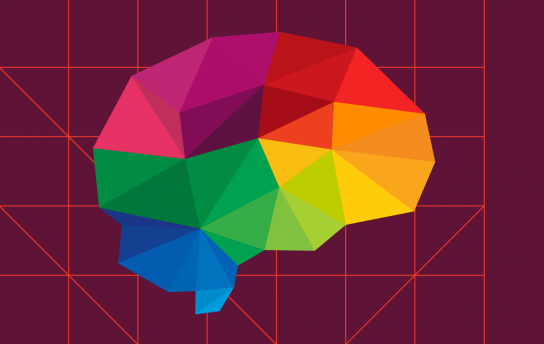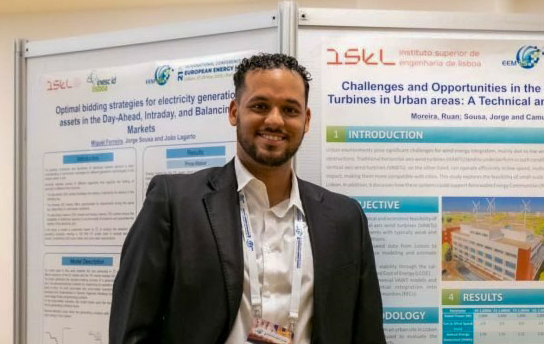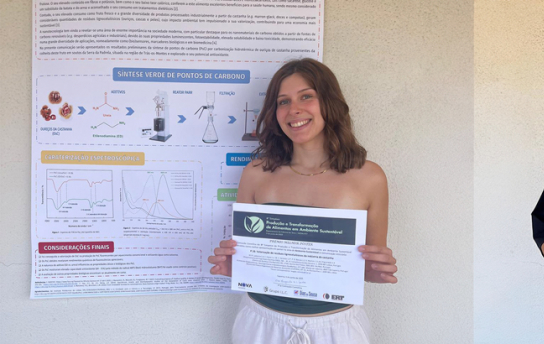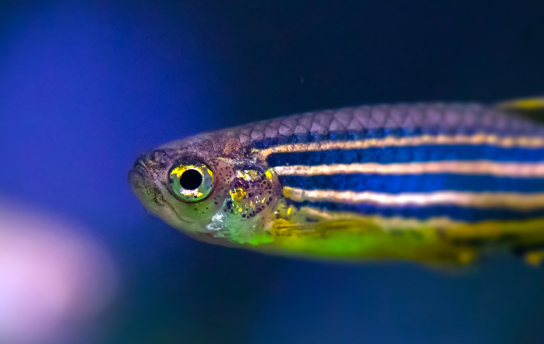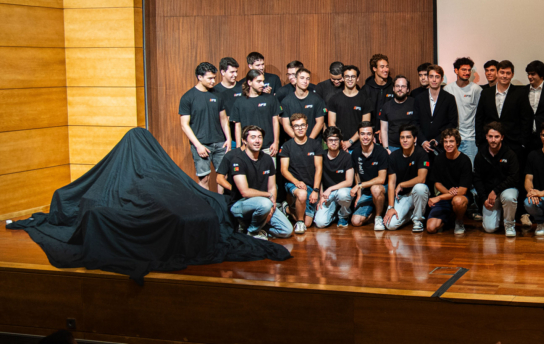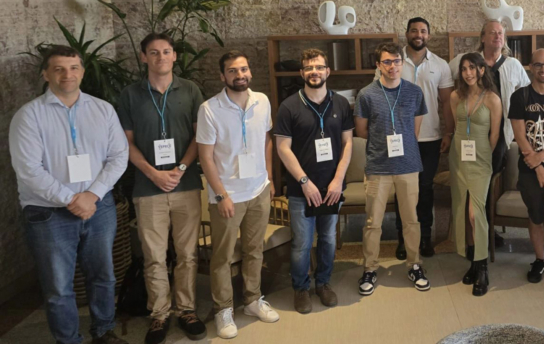ISEL recently formalized the Student Center Network, a structure that aims to value and support student-led initiatives, encouraging their involvement in technical-scientific, cultural, civic, and innovation projects.The Network aims to strengthen the role of the centers in developing extracurricular skills, promoting interdisciplinarity, teamwork, and collaboration with the academic community and external entities.Currently, the Network includes ISEL Game Studios (IGS) and the Aerospace Engineering Center (NEA), which includes the AERIS (Aerospace Engineering and Rocketry at ISEL) and UAV (Unmanned Aerial Vehicles) groups, dedicated to exploring emerging areas of engineering and technology.Membership in the Network is regulated, including criteria for establishment, registration procedures, and associated benefits, such as access to institutional resources, logistical support, and dissemination of activities. Proposals for the creation of new student groups are now open and should be submitted to the Student Group Network Coordinating Committee (CCRNE) by email at idi@isel.pt.More information here.
Ruan Moreira, a Master's student in Electrical Engineering at ISEL, participated in the 21st edition of the International Conference on the European Energy Market (EEM25), held in Lisbon. During the event, he presented a scientific paper that is now published in the IEEE Xplore digital library, consolidating his contribution to the international debate on the future of energy in cities.Entitled "Challenges and Opportunities in the Integration of Wind Turbines in Urban Areas: A Technical and Economic Analysis," the paper was co-authored with Professors Jorge Sousa and Cristina Camus (DEEEA/ISEL). The study focuses on analyzing the technical and economic feasibility of integrating vertical axis wind turbines (VAWTs) in urban environments, where wind conditions are generally less favorable and characterized by high turbulence due to the presence of buildings.Based on real wind data collected in an urban context, the study applied adjusted energy production models to vertical turbines, evaluating annual energy production and the levelized cost of ownership (LCOE) associated with different technological solutions. The research also included an analysis of the integration of these turbines into Renewable Energy Communities (RECs), an energy-sharing model with growing potential in urban areas. Among the models tested, the Q5 2000W proved to be the most efficient, achieving annual production of 3.82 MWh and an LCOE of R$54.10 per MWh, demonstrating potential for application in hybrid systems with solar energy and storage solutions.Although none of the turbines studied proved economically viable in isolation, the results indicate the potential for their integrated application in energy communities or hybrid projects, where their contribution can strengthen urban energy sustainability and resilience.The publication of the article, available at https://ieeexplore.ieee.org/document/11050238.
Students Rui Durão, from the Bachelor's in Biomedical Engineering program, and Rita Ludovino, from the Master's in Biomedical Engineering program, were honored with the best presentation awards at the 8th Symposium on Food Production and Transformation in a Sustainable Environment, held last June at the Faculty of Science and Technology of Universidade Nova de Lisboa.The work presented by student Rui Durão, entitled "Fluorescent carbon nanomaterials from grape pomace: a sustainable approach for biomolecule detection," was developed as part of the Biomedical Engineering Project module, under the guidance of professors Alexandra Costa and Patrícia Barata (DEQ/ISEL). The project won first prize for best poster in the Sustainable Transformation panel, highlighting its creativity in valuing byproducts of the wine industry.Student Rita Ludovino was awarded Best Poster in the Sustainable Environment panel, with the work "Valorization of lignocellulosic waste from the chestnut industry," developed as part of her Master's Final Project, under the supervision of professors Alexandra Costa and Magda Semedo (DEQ/ISEL). The research focuses on the reuse of agro-industrial waste as a resource for sustainable solutions in the biomedical field.These distinctions recognize the merit and commitment of our students and the faculty involved, and highlight the potential of Biomedical Engineering in responding to environmental and sustainability challenges.
Beatriz Nunes Costa, a Biomedical Engineering undergraduate student at ISEL, completed her final project at the Champalimaud Foundation, part of the Vision to Action Lab. The work, titled "Change in heading of preceding movement predicts left–right escape choice in larval zebrafish," was developed under the supervision of researchers Michael Brian Orger and João Carlos Marques (Champalimaud Foundation), and professors Miguel Minhalma and Manuel Matos (DEQ/ISEL).This project focused on studying the orientation behavior of zebrafish (Danio rerio) larvae, with the goal of understanding how the environment influences their movements. This species is widely used in biomedical research due to its genetic and functional similarity to humans—approximately 70% homology at the nervous system level—making it a relevant model for behavioral studies and drug testing with potential applications in human medicine.The work developed by Beatriz Nunes Costa is part of a high-quality research context, reflected in the international recognition of the Vision to Action Lab. Its coordinator, researcher Michael Brian Orge, was recently honored with one of four grants awarded by the European Research Council (ERC) to scientists working in Portugal.The ISEL Biomedical Engineering degree stands out as a leading program, with a strong practical component and connections to the business and scientific world. Over 95% of the Final Projects are carried out at external institutions, fostering students' integration into real-world work environments in healthcare, research, services, and industry. This model aims to provide a solid and applied education, enhancing our graduates' success in the job market.
On July 12th, ISEL's main auditorium hosted another milestone for the ISEL Formula Student (IFS) team, with the official presentation of the new IFS-05 prototype at the highly anticipated Roll Out event.The event was attended by a large audience that reflected the collaborative and enthusiastic spirit that characterizes this project. Current team members, former members, ISEL faculty and staff, sponsors, supporters, and family members were in attendance, all gathered to witness the culmination of months of dedication, innovation, and hard work.During the session, technical details about the new prototype, the project's progress throughout the year, and the team's journey toward international Formula Student competition were shared. The IFS-05 represents another significant advancement in the team's technical and organizational capabilities, which continues to establish itself as one of the leading national representatives in this field.Following the presentation, guests enjoyed a convivial cocktail reception in an informal setting that fostered the sharing of experiences between generations of project members and supporters. This was followed by a visit to the team's workshop, where attendees were able to see up close the space where the IFS-05 took shape and talk to the students responsible for its development.
Ver galeria no flickr
The 9th edition of the Young Engineers Forum in Electrical and Computer Engineering (YEF-ECE 2025) took place on July 4th and featured a strong representation from ISEL. This international event, dedicated to the dissemination of research work developed by master's and doctoral students in the fields of electrical and computer engineering, hosted numerous high-quality presentations, where ISEL students distinguished themselves for their technical rigor, innovation, and communication skills.ISEL was represented by more than a dozen presentations from the MEET, MEIC, MEIM, MEB, MEE and LEETC programs, contributing to a particularly enriching day in terms of scientific discussion and knowledge sharing.One of the highlights was the presentation by Gonçalo Galvão, a former student of the ISEL Master's in Electronic and Telecommunications Engineering (MEET) and current doctoral student, who presented the paper entitled "Integration of Visible Light Communication and Deep Reinforcement Learning to Enhance Urban Traffic Management." The presentation stood out for highlighting the continuity, maturity, and quality of the research initiated at ISEL, reflecting the institution's commitment to advanced training and technological innovation.Also noteworthy is the participation of the following finalist students, who presented papers of recognized merit:Eduardo Marcelo Serra (MEET) – Design of a Multichannel Biosensor based on Directional CouplersMarco Costa Pinto (MEET) – Smart Object Detector System for Visually ImpairedErnesto Velazquez (MEET) – Design of a 2x2 Programmable Matrix of Silicon Photonic Switches based on Mach-Zehnder Interferometer Structures using the Thermo-Optic EffectRuben Azevedo (MEET) – Low-Power IoT Seismic Detection with Machine Learning IntegrationAfonso Gaspar (LEETC) - Decoding Algorithms for Urban Traffic Management System supported by Visible Light CommunicationAntónio Carvalho (MEIC) - Fast Semantic Segmentation of Medical ImagesJoão Silva (MEIC) - A Unified Communication Architecture for Smart Locker Networks and Mobile AccessLetícia Lucas (MEIM) - Cross-Device Platform for Collaborative and Immersive Experiences in Mixed RealityTiago Gonçalves (MEIM) - Continuous Sign Language Recognition through Transformers and MediaPipe LandmarksTiago Silva (MEIM) - Red Light Running Detection Using AI-Powered Object Tracking on Embedded SystemsBruna Alves (MEB) - A Wearable IoT-Based System for Gait Cycle Duration and Symmetry Assessment in Lower-Limb AmputeesWaldemiro Kubucama (MEE) - Efficiency Map of Synchronous Reluctance Motor (SynRM) through Two-Dimensional Finite Element AnalysisRodrigo Beato (MEE) - Permanent Magnet-Assisted Synchronous Reluctance Motor for Traction SystemsAlso worth highlighting is the participation of student Afonso Gaspar, from the Electronics, Telecommunications, and Computer Engineering (LEETC) program, whose presentation was based on the work developed in his project. Their presence in a forum predominantly focused on master's and doctoral students is a source of special pride for ISEL.These works reflect ISEL's strong commitment to scientific excellence, demonstrating the ability of its students to contribute innovative and relevant technological solutions to the field of engineering.

